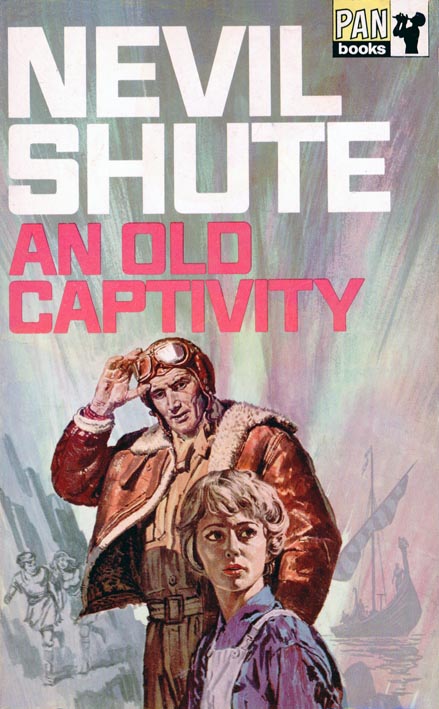I first read this book when I was much too young for it and it made a huge impression on me. I had no idea at the time that the book wasn’t contemporary—it was published in 1940, and I would have read it in the early seventies. An Old Captivity is on an odd cusp of genre. Most of the book concerns the details of setting up an archaeological expedition to Greenland (in the late thirties). Shute was always interested in technology and planes and flying, and here he makes the seaplane and the photography seem absolutely real. Running alongside that is the archaeology—the Norse settlement of Greenland, the possible Celtic settlement. We learn a lot about these things slowly and in a very science fictional way before the book plunges outright into fantasy with the pilot’s dream of the discovery of Vinland, vindicated, within the novel, by his recognising geography he had never visited and locating a stone carved with runes.
An Old Captivity was published as a mainstream novel—certainly my paperback copy was published as a bestseller. It also contains a charming low-key romance. I’m not sure how it would be published now or if it could be published now. The combination of cylinder heads and true dreams doesn’t seem to fit. It’s also a character portrait of Donald Ross, the pilot, a man of action who isn’t like any action hero. And reading it now it’s also a historical novel—it’s astonishing to read about people changing into dinner jackets as if it’s a normal thing. It’s also alternate history—it’s set a few years ahead of a late thirties year that had no WWII, when commercial planes were common but they weren’t jet planes, or fast.
I still find it absolutely unputdownable—even weak Shute has that quality of absolute readability, and this isn’t weak. He always has that “IWantToReadIt” thing. I can see flaws in it I couldn’t see as a child. Shute is patronizing towards the native people of Greenland. While he isn’t sexist towards Alix Lockwood, the heroine, he is towards her analogue in the Norse section, Hekja. The heart of the romance between Alix and Ross is in an odd place, because of the doubling.
There’s also an oddity of point of view. I only noticed it on this reading, despite having read it probably half a dozen times over the last four decades. There’s a part of the dream section where the omniscient narrator says it was hard for them to think abstractly because they had very little vocabulary for it. I noticed suddenly that we’ve pulled back a long way from immediacy, and who is supposed to be speaking anyway? This is a symptom of a larger problem. This Vinland story is told in three frames. We have the first person point of view of a psychiatrist who meets Ross on a train, who utterly disappears from view after the establishing chapter. Then we have Ross’s story as told to him, in third person—Shute was fond of this kind of framing. Then within Ross’s story we have the story of Ross’s dream as told to Lockwood and overheard by Alix. Ross is telling the story in the first place because he wants reassurance that he’s sane despite it, but we never have any closure on that frame. Then why would he want that? The text, by finding the rune stone, is absolutely of the opinion that it was a true dream and leaves no space for doubt. It’s a paranormal experience that you’d be mad to doubt after that degree of confirmation, not mad for experiencing. We also get pieces of Alix and Lockwood’s points of view which it would be impossible for Ross to report to the psychiatrist on the train.
Of course, as I never noticed this before it’s probably not a big problem for most readers. I did notice, even as a child, that it ends very abruptly, and it’s very hard to imagine what kind of life Alix and Ross would live afterwards, as they have so little in common in everyday life. (I don’t suppose they had much life left. I’m quite sure he was killed in the Battle of Britain and she was probably killed driving an ambulance in the Blitz.)
Shute is amazingly good at giving little technical details and making them fascinating. After reading this I feel as if I could fit out an expedition for Greenland in 1938, though of course this is entirely illusory. They have a seaplane very like the one in the story in the Smithsonian air and space museum in DC, and I recognised it immediately. The details of the Norse section are out of date—there has been a lot more archaeology since, and the Viking settlements in Greenland were not where Shute imagined them. The imagery of the abandoned colony connects directly for me to Le Guin’s Planet of Exile (post) and if it isn’t history it can still be fantasy.
Jo Walton is a science fiction and fantasy writer. She’s published two poetry collections and nine novels, most recently Among Others, and if you liked this post you will like it. She reads a lot, and blogs about it here regularly. She comes from Wales but lives in Montreal where the food and books are more varied.










